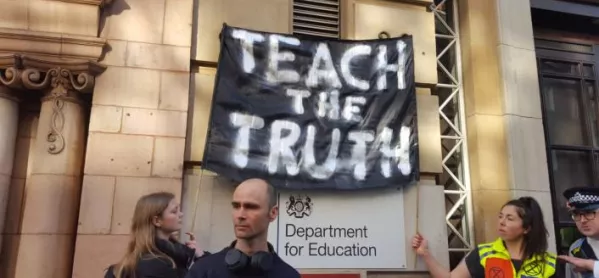Environmental campaign group Extinction Rebellion (XR) is hoping its ongoing fortnight of protests will continue to shut down large parts of central London next week.
Activists have already blockaded locations including Trafalgar Square, Victoria Embankment and Whitehall, while Lambeth Bridge and Westminster Bridge have been closed to traffic.
The campaign cites the United Nations’ Intergovernmental Panel on Climate Change (IPCC) which says there are just 12 years to limit global warming to 1.5C, because if it reaches 3.5C, the effects will be “catastrophic”. Teachers are already getting involved. But should you join them?
Read: Teachers urged to quit their jobs to save planet
Union: Teachers oppose ‘reprisals’ for pupils protesting about climate change
Student protest: Meet the UK pupils striking against climate change
What role are teachers playing?
Tes has spoken to teachers who were arrested while campaigning for XR last year and have since quit their jobs so they can campaign more. Former primary school teacher Shulamit Morris-Evans, 24, from London, who was found guilty of aggravated trespass and criminal damage, said: “A sense of time running out compelled me [to leave teaching] because I was suddenly aware of how much needs to be done in so little time.”
Former RE teacher Tim Jones, 36, also from London, who was arrested for obstruction of a highway, quit his £39,000 a year job and is now living “on the generosity of friends and family”. He said: “If more people do not stop doing what they see as normal and start doing something more radical then we’re all in serious trouble.”
One 25-year-old teacher from London said he had booked the week off to join the protests. “I booked the week off work for this. The school kids are out protesting too,” he told Metro.
But London science teacher Ed Stubbs, 28, said he would only be joining the protests after work and was content to cover “a lot” about climate change in his lessons.
But how can teachers really be involved if protests are in term time?
The last major protests by Extinction Rebellion took place in the Easter holidays, making it easier for teachers to take part, but this time the protests are taking place during term time.
London-based teachers are still being urged to attend protests - after school - while teachers elsewhere can get involved in the admin side of things such as handling media and planning and supporting different actions.
Art teacher Kate Shipp, 55, from London, who is awaiting sentence from a district judge after she was found guilty of a section 14 offence during a previous XR protest, said she was planning to attend this week’s protests on evenings and the weekend, and on her day-off this Friday. But she said: “Even if we’re not on the streets we can still support other people.”
Teachers will also be running education-focused workshops and informal talks on topics such as how to talk to children about climate change and how the education system needs to change.
What would your headteacher do if you were arrested?
Ms Shipp said her headteacher was “really supportive” after she was arrested and had to take two days off work to attend trial in magistrates’ court.
Shulamit Morris-Evans said “My headteacher was shocked [that I had been arrested]. He wasn’t pleased at all, but didn’t threaten any immediate action or consequences. I was really grateful.”
Tim Jones admitted that, should he return to teaching, a headteacher may refuse to give him a job following his arrest, but said: “I’m more worried about what’s gonna happen [to the climate] over the five to ten years.”
What’s the advice from the unions?
“It is a matter for individual teachers if they want to take part in the Extinction Rebellion after school hours, and the right to participate in protests is of course a sign of a healthy and functioning democracy,” says Geoff Barton, general secretary of the Association of School and College Leaders.
However he added: “Anybody who is minded to get involved in activity which leads to the possibility of being arrested needs to be mindful of the national Teachers’ Standards, which require consistently high standards of personal and professional conduct.
“It would be up to an employer to decide what action to take if a teacher was arrested but our advice is to avoid this situation arising.”
What example are you setting to your pupils?
“Am I a good example? Absolutely I am,” said Tim Jones. “We are non-violent and we are respectful to the police, and this is a really important lesson.
“And what the youth strikers are doing by going against the rules is in itself an education.”




